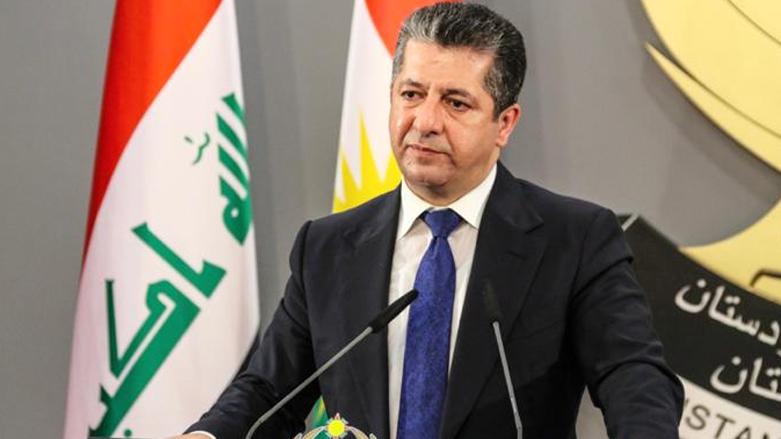KRG sees ‘pivotal year’ for domestic reform, says Prime Minister Masrour Barzani
KRG sees ‘pivotal year’ for domestic reforms

ERBIL (Kurdistan 24) – The Kurdistan Region has a decisive year ahead as its government has undertaken various reforms to boost revenue and cut bureaucratic red tape in governmental institutions, the Region’s prime minister said on Wednesday.
In a press conference held in the capital, Kurdistan Regional Government (KRG) Prime Minister Masrour Barzani shed light on a number of topics, including Erbil-Baghdad relations, domestic reforms the government is pursuing, and the Sinjar Agreement.
Domestic Reforms
By March, he said, “500,000 digital IDs will be issued to public sector employees, giving the KRG a basis to provide our citizens digital services,” following through on a project he first announced in late November 2020.
“We’ve ended all tax exemptions. It doesn’t matter who you are, everyone must pay their fair share,” said the premier. To date, more than 100 companies have been referred to the judiciary as they had failed to pay their taxes, he said.
The KRG is also in talks with private banks to manage “e-payments,” said the premier, adding that the second phase of the government biometric system for reviewing the payroll system is “almost complete.”
In order to digitize citizens’ daily affairs and reduce bureaucratic hurdles, the KRG will be “integrating many citizen services: driver licenses, car registrations, smart meters, procurements, residency,” and other aspects of daily life, Barzani said.
Erbil-Baghdad Relations
Premier Barzani also shed light on the lingering issues between Erbil and Baghdad and the Region’s financial entitlements and rights.
“Our differences [with Baghdad] go far beyond the budget,” he said, explaining other sources of conflict between the two sides, including the disputed territories and the Region’s share in investment and sovereign expenses.
“We cannot be expected to fulfill duties alone,” Barzani said as he stressed that the “relationship with Baghdad must be based on rights and duties.”
With regards to the KRG’s relationship with state-owned SOMO company – which markets Iraq’s oil – Barzani said the Region deals with Iraqi government rather than the state company as “SOMO does not represent the new Iraqi federal state and Kurdistan is not represented in the organization.”
Barzani also said that claims that KRG sells its oil for less than SOMO are “baseless.”
Handing over the oil dossier to the federal government would be “giving up a constitutional right of the Kurdistan Region,” he said.
Sinjar Agreement
In early October 2020, the Federal Government of Iraq and the KRG announced they had reached an agreement to restore and normalize the situation in the Sinjar (Shingal) area, where competing armed groups are active, namely the Kurdistan Workers’ Party (PKK) and Popular Mobilization Forces (PMF).
The agreement involves understandings on security, civil administration, reconstruction and service rehabilitation, and the return of people displaced during the war against the so-called Islamic State.
“The Sinjar Agreement has not been implemented in accordance with the terms,” Barzani said on Wednesday, stressing that forces that were supposed to leave still “remain in the area.”
Barzani reiterated his call for “the full implementation of the agreement.”
KRG Cooperation with Coalition against ISIS
The prime minister further mentioned that the KRG’s cooperation with the US-led coalition against ISIS is within the framework of the federal government’s agreements with those forces.
“Coalition forces are here at the invitation of the Iraqi federal government to help defeat ISIS,” Barzani said. “There are agreements by the federal government that govern the coalition presence.”
“That’s the basis of KRG’s cooperation with the global coalition,” he added.
Press Freedom
“I have a lot of respect for journalists and their careers as I support freedom of speech in all of its kinds,” Barzani said during the briefing, denying that the KRG is against criticism of the government or any entity.
Barzani also said journalists have to protect their industry from those who would do “illicit works” under the banner of journalism.
Referring to a number of arrests made by authorities in recent months, Barzani said “Some of the [arrested] individuals were agents of foreign spy agencies.”
Another group “were armed and plotted to explode buildings and attack foreign citizens,” Barzani said, reiterating that they were not journalists but exploiting the career for their own agenda.
“The KRG supports journalism and the rights of journalists in all forms,” Barzani stressed.
Editing by Joanne Stocker-Kelly